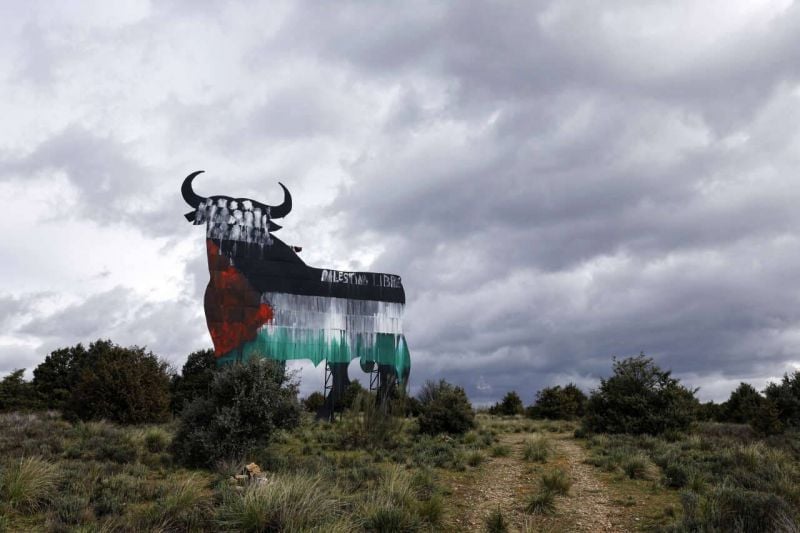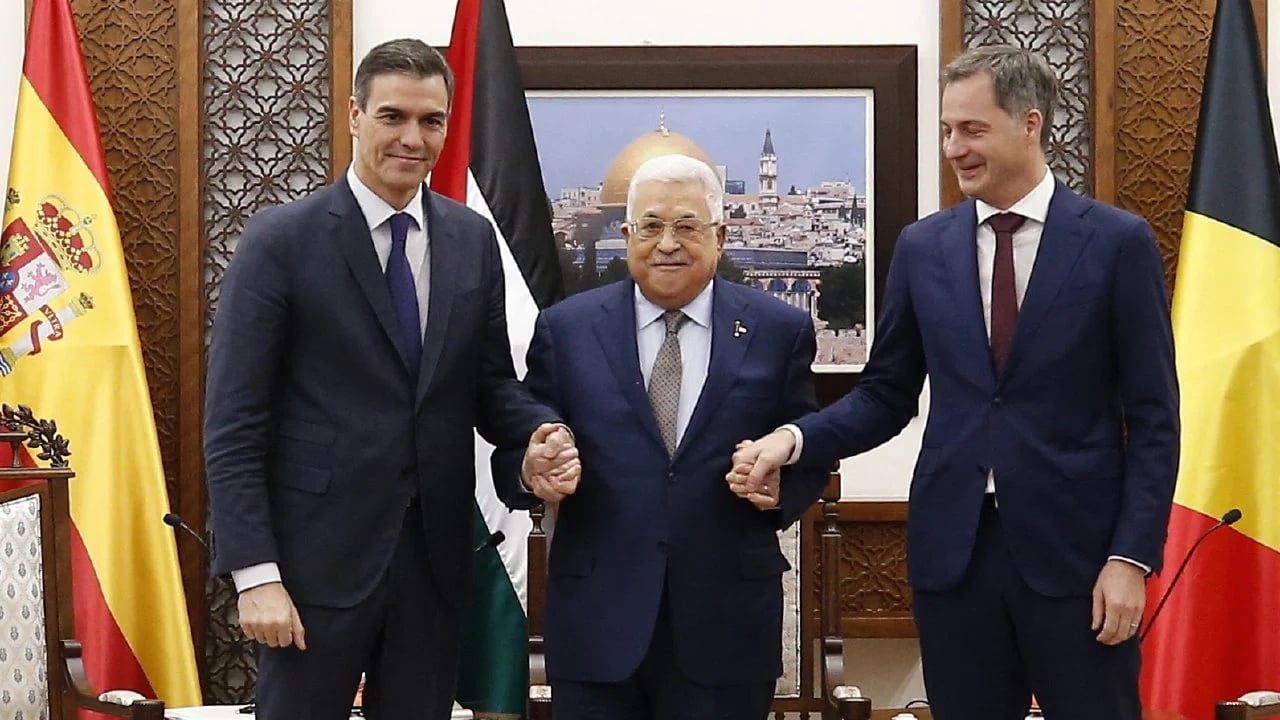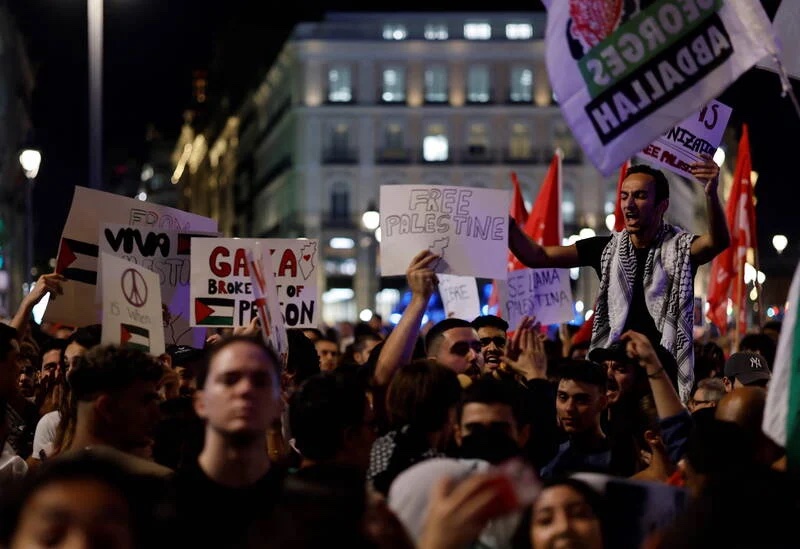
A billboard of Osborne Bull painted with the Palestinian flag and the inscription "Free Palestine" (Madrid, Spain), March 27, 2024. (Credit: AFP)
Spain has committed itself to revive an old promise by July: to recognize Palestine as a state. As the war in Gaza rages through the half-year mark, Spain’s left-wing government, led by Prime Minister Pedro Sánchez, has decided to make Palestinian statehood its "first commitment" in foreign policy. The socialist leader first made this declaration when he was reelected as head of the government on Nov. 16. Now, he has gone even further, suggesting the European Union (EU) break its strategic partnership with Israel, citing violations of international humanitarian law.
Staunch support for Palestine isn’t new in Spain, but it’s still marginal within the EU. Spain came forward as pro-Palestine early in the war, even as Brussels was still expressing its almost unconditional support for Israel. At that point, criticism of the Israeli government and its violent military response after Oct. 7 was still muted, while heavyweights such as France, Germany, and the United Kingdom were unilaterally invoking Israel's right to self-defense.
A discourse quickly tempered on the Spanish side. On Nov. 23, 2023, Pedro Sánchez was received by his Israeli counterpart, Benjamin Netanyahu. The meeting between the two men appeared tense and cold. The Spanish leader strongly condemned the Oct. 7 attacks and insisted on the "immediate and unconditional release of the hostages," but did not hesitate to describe the destruction of Gaza as "unbearable" and expressed doubts about Israel's respect for international law.
 The President of Palestine, Mahmoud Abbas, surrounded by the Spanish Prime Minister (left), Pedro Sánchez, and the Belgian Prime Minister, Alexander De Croo, during their visit to Ramallah on November 23, 2023, at the offices of the Palestinian Authority in the West Bank. (Credit: AFP)
The President of Palestine, Mahmoud Abbas, surrounded by the Spanish Prime Minister (left), Pedro Sánchez, and the Belgian Prime Minister, Alexander De Croo, during their visit to Ramallah on November 23, 2023, at the offices of the Palestinian Authority in the West Bank. (Credit: AFP)
That same day, Sánchez and Belgian Prime Minister Alexander de Croo were received in Ramallah by Mahmoud Abbas, president of the Palestinian Authority, in a completely different atmosphere. Smiling, exchanging warm hugs, the two European leaders expressed their desire to move forward on the two-state solution, a position Hamas thanked them for two days later, hailing the two leaders’ “clear and bold position.”
“Condemning the vile attacks of a terrorist group like Hamas, and at the same time condemning the indiscriminate killing of Palestinians in Gaza, is not a question of political parties or ideology, it is a question of humanity,” Sánchez said the next day, during a speech to thousands of socialist executives and activists in Madrid.
However, for Israel, the Spanish leader's tour of the Middle East marked the beginning of a diplomatic crisis. Deeming his remarks "scandalous," Tel Aviv accused the Spanish government of "supporting terrorism," summoned the Spanish ambassador for a "severe reprimand," and refused to participate in the Union for the Mediterranean summit, held in Barcelona on Nov. 27. Spain was not swayed.
After seven World Central Kitchen aid workers were killed in an Israeli strike in Gaza on April 1, Sánchez described Netanyahu's "supposed explanations" as "totally unacceptable and insufficient."
Proximity with Arab countries
Similar to Ireland, one of the most sympathetic European voices to the Palestinian cause, whose support stems from a shared history marked by occupation and colonization, "Spain's unique support for Palestine can [also] be attributed to several historical factors," points out Itxaso Domínguez de Olazábal, a professor at Carlos III University of Madrid.
The two countries had difficulty acknowledging each other. Israel was particularly reluctant to consider Spain as a member of the United Nations after World War II due to its proximity to Nazi Germany, and “it was only when Spain joined NATO [1982] after Francoism that the country began to align with EU partners in recognizing Israel [1986] and maintaining good relations with it," says Gabriel Garroum Pla, a researcher at Pompeu Fabra University in Barcelona.
During this period, Madrid turned its focus towards Arab countries with which it shares a history, albeit one marked by conquests and geographical proximity. Spain wanted to be “perceived as a nation aligned with the interests of the southern neighborhood of Europe and the Arab countries," explains de Olazábal. This has given it a prominent role diplomatically.
In 1991, under Socialist Felipe González’s government, an international peace conference was held in Madrid. It would be considered a prelude to the Oslo Accords signed two years later. On Oct. 26, 2023, it was Pedro Sánchez, then President of the Council of the European Union, who managed to organize a similar meeting.
"Sánchez insisted that the recognition of the Palestinian state should not be concluded in isolation, but that a group of countries should assume this responsibility. In fact, he hopes that his position will have a 'domino effect' on the rest of the EU," says Enrique Javier Díez Gutiérrez, lecturer at the University of León.
In Europe, several countries have already taken this measure, such as Sweden, Hungary, Malta, and Romania, but the major EU states have yet to do so. In 2014, under a conservative government, the Spanish Parliament adopted a resolution calling for the recognition of the Palestinian state. It was non-binding and no concrete steps were taken.
"While both the right and the left have maintained a position of support for years, even decades, the issue was generally not perceived as ideological until recently," de Olazábal says. Today, the Palestinian issue is highlighting existing divisions within parliament.
"Spanish conservatives and the far-right are questioning whether to recognize the Palestinian state in the midst of a conflict, while Sánchez's partners are pushing him to be more courageous in facing Netanyahu and his government," explains Enrique Javier Díez Gutiérrez.
Pragmatism and arms sales
By affirming his commitment to the recognition of a Palestinian state, the Spanish prime minister is consolidating his coalition of radical left parties, but risks being associated with the rogue behavior of some of his partners.
The socialist leader had to reign in Ione Belarra, leader of Podemos, a far-left party allied with the government when she asked the government to break diplomatic relations with Tel Aviv. She also mentioned, back in October 2023, Netanyahu's intention to commit a “planned genocide” against the Palestinians.
Belarra, along with two current ministers from the left-wing Sumar party, have refused to condemn Hamas’ Oct. 7 attacks. Diplomatic chaos ensued, followed by a press release from the Israeli embassy in Spain accusing “certain elements of the Spanish government [of] aligning with the Islamic State-type terrorism” of Hamas.
“In any government, there are varying sensitivities,” but “for foreign policy, there are only two voices: that of the Prime Minister and that of the Minister of Foreign Affairs,” the head of Spanish diplomacy, José Manuel Albares hastened to add.
Some analysts argue that Spain's position ultimately remains pragmatic. "It is mainly about recognizing and supporting Palestine without upsetting Israel too much. Unlike Ireland, where the colonial aspect is central in public discourse," says Gabriel Garroum Pla.
Madrid will maintain commercial and strategic relations with Tel Aviv, although these exchanges are difficult to assess due to "the opacity of the authorities,” Itxaso Domínguez de Olazábal says. "Spain can be considered complicit due to its involvement in the sale and acquisition of military equipment in Israel.”
In January, Albares declared that the country had not sold any weapons to Israel since the beginning of the war, claiming to have imposed an embargo in this regard. But a report published by the Spanish newspaper El Diario showed that in November, Madrid had exported ammunition worth about $1.1 million to Israel.
"The material was intended for tests or demonstrations" and "corresponded to licenses granted before Oct. 7," the Spanish Secretary of State for Trade later said. Still, when this information was made public, it triggered large demonstrations in the capital.
 Protesters gather in support of the Palestinian people in Madrid on October 9, 2023. (Credit: Oscar Del Pozo/AFP)
Protesters gather in support of the Palestinian people in Madrid on October 9, 2023. (Credit: Oscar Del Pozo/AFP)
The Spanish population is the most pro-Palestinian in Western Europe, according to a survey conducted in May 2023 by the Pew Research Center, in eight European countries as well as the United States, and the Spanish leader’s position can be primarily understood through this lens.
"In his latest statements, he has repeated that he expects Spain to recognize the Palestinian state before July, which will likely coincide with the European election campaign on June 9," says Enrique Javier Díez Gutiérrez.
At a time when the far-right is gaining ground in Europe, being one of the few voices for the Palestinian cause in the region could be an opportunity for Sanchez to establish himself as the unwavering custodian of an old promise of the left.
This article was originally published in French on L'Orient-Le Jour. Translation by Olivia Le Poidevin.
